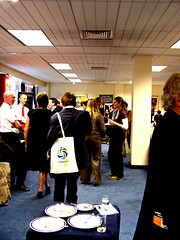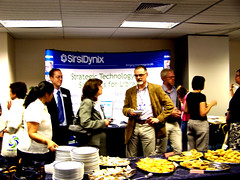The University of Hudderfield Library is entering into the 2nd phase of a 3 year refurbishment. Last year, it was the entrance floor, and this year it’s the two subject floors above. Floor 5 is already cleared of stock, and floor 6 will be empty by the end of next week.
I couldn’t resist spending a few minutes wandering around the deserted floor 5 this afternoon. Most times of the year, it’s a vibrant and busy subject floor — today is was eiree and desolate. With the shelving and staff gone, you get a real sense of the space and size…


The floor of the former PC room is dotted with circular patches where the culmulative effect of hundreds of students on PC swivel chairs has gradually worn away the carpet. It’s like something out of a sci-fi film where people get zapped and turned into a small round pile of ash 😉

You can find the rest of the photos here.






Month: May 2008
2008 — The Year of Making Your Data Work Harder
Quite a few of the conversations I’ve had this year at conferences and exhibitions have been about making data work harder (it’s also one of the themes in the JISC “Towards Implementation of Library 2.0 and the E-framework” study). We’ve had circ driven borrowing suggestions on our OPAC since 2005 (were we the first library to do this?) and, more recently, we’ve used our log of keyword searches to generate keyword combination suggestions.
However, I feel like this is really just the tip of the iceberg — I’m sure we can make our data work even harder for both us (as a library) and our users. I think the last two times I’ve spoken to Ken Chad, we’ve talked about a Utopian vision of the future where libraries share and aggregate usage data 😀
There’s been a timely discussion on the NGC4Lib mailing list about data and borrower privacy. In some ways, privacy is a red herring — data about a specific individual is really only of value to that individual, whereas aggregated data (where trends become apparent and individual whims disappear) becomes useful to everyone. As Edward Corrado points out, there are ways of ensuring patron privacy whilst still allowing data mining to occur.
Anyway, the NGC4Lib posts spurred me on into finishing off some code primarily designed for our new Student Portal — course specific new book list RSS feeds.
The way we used to do new books was torturous… I’ve thankfully blanked most of it out of my memory now, but it involved fund codes, book budgets, Word marcos, Excel and Borland Reportsmith. The way we’re trying it now is to mine our circulation data to find out what students on each course actually borrow, and use that to narrow down the Dewey ranges that will be of most interest to them.
The “big win” is that our Subject Librarians haven’t had to waste time providing me with lists of ranges for each course (and with 100 or so courses per School, that might takes weeks). I guess the $64,000 question is would they have provided me with the same Dewey ranges as the data mining did?
The code is “beta”, but looks to be generating good results — you can find all of the feeds in this directory: https://library.hud.ac.uk/data/rss/courses/
If you’d like some quick examples, then try these:
- Entrepreneurship MSc (course details)
- Management by Action Learning MA (course details)
- Youth and Community Work BA(Hons) (course details)
- Performing Arts (Performance) FdA (course details)
- Early Primary Education BA(Hons) (course details)
- Logistics and Supply Chain Management BSc(Hons) (course details)
- Fashion Design (Top-up) BA(Hons) (course details)
- Product Design BA/BSc(Hons) (course details)
Is your data working hard enough for you and your users? If not, why not?
quick conference summary
Graham and Ian have already said many of the things I was planning to say, so just a quickie blog post and I’ll try and add more later…
A big “thank you” to everyone who was involved in organising the conference — I think it’s safe to say it was a huge success. A huge amount of face-to-face “social networking” went on, which partly explains why I didn’t have time to blog anything!
I’m sure I read a blog post/comment from Stephen Abram that Enterprise wasn’t going to be an OPAC bolt-on front-end (like Primo, Endeca, AquaBrowser, VuFind, etc), but that’s certainly how it was pitched at the conference. One question I was planning to ask, but forgot, was whether or not the relevancy ranking algorithm would be tweakable — the demo threw up some iffy results (e.g. a search for “dogs” ranked a book that didn’t contain the keyword anywhere in the title/author/summary higher than other books that did). Being able to give certain MARC fields a higher priority for relevancy ranking is a “must”.
Keynote speaker Sue McKnight was extremely quotable, and here are a few of my scribbled bullet point notes from her session:
- “we need to adapt to the digital mindset”
- don’t give stuff sexy/trendy names — if it’s a information desk, then all it an “information desk”
- we need to be creating the future and not be the victims of change
- “…Shibboleth?! Bloody Hell!!!”
- “become a change junkie”
- “the status quo isn’t an option”
Ever since seeing Helene Blowers present, I’ve watched what presenters do with their hands (Helene is very kinetic and is almost impossible to photograph). CODI President Amy Terlaga must be double-jointed, as I certainly can’t do this with my thumbs (I tried, and it hurt!)

As Ian has already mentioned, the news about Horizon 7.4.x in the UK was extremely disappointing.
The two User Groups decided to combine, but decided to take a vote on what their new name should be. As soon as the name is chosen, I’ll rebrand the DUG Wiki (https://library.hud.ac.uk/dug). I’ll also be adding the presentations to the wiki (as soon as I’ve got permission from each presenter).
The plan is to put together a registration page for the new User Group that will:
1) register your organisation as a member
2) set you up with a wiki account (so you can edit the pages)
3) let you vote for the new name for the group
We’re also planning to look at chat technologies to help move away from face-to-face meetings, which are always difficult for non-UK members to attend.
So, keep a close eye on the wiki for further info!
I’ve also finished uploading all of my conference photos to Flickr…





Southampton – day one
The presentations for day one of the conference have drawn to a close and there’s only time for a quick blog post before we all head off for an evening of nautical fun and frolics on the “Three Rivers Cruise”. Cross your fingers no-one falls overboard!
Unfortunately, for “personal reasons”, CEO Gary Rautenstrauch isn’t at the conference, which is a shame.
The opening keynote by Keith Sturges talked about the continuing change within the company (something which most customers are only too aware of) and the continuing growth of the company (16%, compared to a sector average of 8%). The SaaS (Software as a Service) model is being pushed hard, with the UK hosted solution handled by IBM in Greenock, Scotland (“the most miserable place you could ever go to”!).
I’m still sceptical of SaaS being a “must have” for UK academic libraries. There are good and valid reasons why universities would prefer to have control over their servers and IT infrastructure — integration with other systems being a key one.
Next up, Kevin Rushbridge (Project Co-ordinator for the Swift Consortium) talked about the state wide consortia model set up in Victoria, Australia. I thoroughly interesting presentation — I think Kevin is speaking at a CILIP event soon? If so, he’s well worth going to see. I was tempted to put my hand up at the end and ask “did you consider Open Source?”, but manged to resist.
After the afternoon break, Talin Bingham (Chief Technology Officer) presented the Symphony product roadmap. As reported elsewhere, Enterprise is the upgrade path from EPS/Rooms and e-Library is the replacement OPAC for iBistro/iLink.
The big news from Talin is that Microsoft SQL Server 2005 will become an alternative database option for Symphony 3.3 (which is due 2009), with support for SQL Server 2008 coming afterwards.
One thing that’s always bugged me about iLink/iBistro is that the book title isn’t a clickable link in a set of search results. In the screenshot of e-Library, it looked like that was still the case.
Talin also mentioned that URSA is continued to be developed, but without support for the British Library, it’s a product that has very little relevance to many UK libraries.
I’ve not had chance to upload images from the presentations, but there’s a clutch of photos from the registration and lunch on Flickr:
www.flickr.com/photos/davepattern/tags/14may2008/



Sexy SirsiDynix shenanigans in sunny Southampton
(Well, it’ll be sexy in-so-far as I’m including some gratuitous nudity in my session on “RSS and Social Networking” on Thursday. Will I be stripping off and revealing all in the name of “2.0”? You’ll have to come along and find out!)
I’m currently sat in Manchester Airport, waiting for a budget flight down to Southampton, which is playing host to this year’s “Dynix Users Group/European Unicorn Users Group Joint Conference“. High on the agenda is the merging of the two user groups, and hopefully a shorter name — my personal choice is still “SirsiDynix Libraries User Group”, if only for the cool “SLUG” acronym.
As Ian has already mentioned on his blog, European Horizon users are crossing their fingers that SirsiDynix CEO Gary Rautenstrauch’s “commitment to our worldwide customer base” will result in an announcement that Horizon 7.4.2 will be made available to non-US customers. Sadly, the 7.4.1 release was a US only affair and UK sites are still tootling along (quite merrily, it has to be said) on 7.3.4.
Right — must dash, my boarding gate has just been announced! 3G card allowing, I’m hoping to blog and Flickr the conference.
new API from OpenLibrary
Great to see that OpenLibrary (“One web page for every book”) now has an API!
There’s an interesting debate going on via the Code4Lib email list regarding the API. Specifically, should they have used SRU or is exposing a simple API better? Personally, I’m all for simple APIs that non-library techies can pick up and run with.
I’ve worked as a developer in libraries now for nearly 14 years and I’ve never used (or even seriously looked at) SRU. When I read the specification, I can feel my eyes begin to slowly glaze over! Perhaps this is just because I cut my teeth writing EDI processing software in COBOL and I’ve always suspected that people who develop specifications for use in libraries (e.g. Edifact, Z39.50, MARC, etc) are all a bunch of masochists 😉
Nympho Librarian
Currently doing the rounds of email inboxes at our library is this little gem…

To paraphrase a conversation that occurred in the LSW chatroom last week…
Librarian 2.oooooooooooooooh!
Librarian 3.in.a.bed?
Librarian Phwooooar!
I like the way the poor patron is still trying to read his book!
Giving it all away
Fans of Chris Anderson might want to check out this article which appeared in today’s Guardian newspaper in the UK: “The big giveaway“…
International flights that don’t cost a thing? Books or music you don’t have to pay for? Even companies handing out cars? Traditional business is based on the certainty that everything has a price. But now US writer Chris Anderson believes we are at the dawn of a new consumerist era, governed by what he dubs ‘freeconomics’.
Scrum and Agile
I’m sure many SirsiDynix customers remember the terms “Scrum” and “Agile” being bandied around a few years ago during the development of Horizon 8.0. What I don’t remember being as widely reported at the time was that half of the developers were based in Russia (the other half were based in Provo, USA).
Anyway, the Google Blogsearch RSS feed for SirsiDynix threw up an interesting blog post last week: “Managing Offshore Software Projects“.
This project distributed Scrum teams so that half of each team was in the United States at SirsiDynix and the other half of each team was at Exigen Services in St. Petersburg, Russia. It showed how to set up distributed/outsourced teams to achieve both linear scalability of teams on a large project and distributed velocity of each team the same as the velocity of a small colocated team.
This project is still generating controversy in the Agile community by showing that you can run distributed high performance Scrums. There were quality problems on this project that caused some in the Agile community to discount the remarkable results and argue that it could not be repeated successfully.
I guess whatever your thoughts about Jack Blount and Horizon 8 are (or were), it certainly seems he knew what he has doing!
Whilst I’m thinking about Jack, I’d like to offer my sincere condolences to the Blount family for their recent loss.